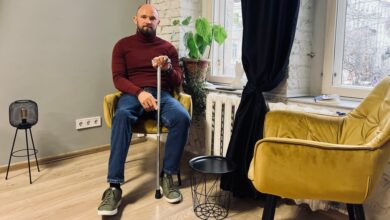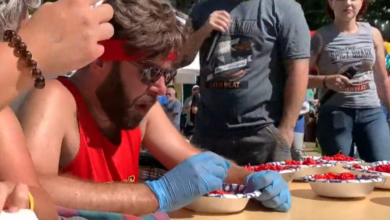Pastors serve gangs in El Salvador during a crackdown

SAN SALVADOR, El Salvador –
The smell of pineapple bread fills the kitchen of “Vida Libre,” or “living free,” a gang rehabilitation program founded in El Salvador in 2021 by American Reverend Kenton Moody.
The trust Moody places in former gang members is not widely shared. Thousands of lives have been destroyed in this Central American country after decades of gang violence.
Over the past year, President Nayib Bukele’s security forces have cracked down on gangs, arresting more than 68,000 people suspected of criminal involvement, though human rights groups say innocent people are also being detained.
Ministries like Moody’s are in the thick of it. Dozens of men who were part of evangelical rehabilitation ministries were also arrested and returned to prison. Of the 38 members of Vida Libre, ten have been detained by the government.
At the Vida Libre complex, in the impoverished city of Santa Ana, Moody regularly hugs the young men in his care and gives them chores.
Recently, Angel and Kevin sprinkled sugar on pastries at the bakery. Salvador replaced light bulbs in the barnyard. Moody asked to identify them by their first name for their safety.
Andy, who makes wooden key chains to sell, said a gang recruited him when he was 12. The 29-year-old joined the Moody’s program two years ago after nearly a decade in prison.
“Maybe humanity sees me as someone who is evil, but I hope that with my attitude that changes every day, I can prove that I am different,” he said.
——
The first big gangs were born far from El Salvador.
To flee the country’s civil war, half a million Salvadorans migrated to the United States in the 1980s. The majority settled in Los Angeles and after joining Mexican criminal groups, the Mara Salvatrucha 13 (MS-13) and Barrio 18 gangs were formed there.
In the 1990s, the US deported 4,000 gang members to El Salvador. The government estimates the current number of gang members at 76,000.
After arriving in El Salvador, MS-13 took control of about half of the territory and Barrio 18 most of the rest. A few spots were considered neutral.
Many Salvadorans were forced to internalize unwritten rules such as avoiding hostile neighborhoods, dressing according to gang standards, and paying extortion demands to survive.
Last year, following a spate of gang violence, Bukele issued an emergency decree suspending certain civil liberties, including access to a lawyer and the right to be informed of the reason for an arrest.
According to official data, about 5,000 people were released after the government failed to link them to criminal groups.
——-
Moody founded Vida Libre after visiting a juvenile detention center where gang members from a nearby community were incarcerated for burying a woman alive.
Fearing that they would return to gang life upon release, he wondered: How can I really help?
“A church is the foundation to support people moving forward,” he said.
His evangelical church, “La Puerta Abierta”, meaning “open door”, is a cornerstone for social projects funded mainly by US donors.
Vida Libre, one of the Church’s programs, takes care of minors who are nearing the end of their prison sentences. The goal is to provide an adequate transition to society, said Allan Espinoza, who is leading the project.
The stigma of prison makes it difficult for ex-convicts to resume their studies or find work. Vida Libre offers workshops in agriculture, carpentry, car painting and baking.
The participants get up at 5 a.m. to attend a morning service and they read the Bible daily. Breaking the rules leads to eviction and rehabilitation takes time, Espinoza said. Some tell him they want to leave, but he asks them to be patient.
Others knock on his door to talk and, once in his office, just cry.
——
Not all evangelical churches in El Salvador open their doors to gang members, but in most marginalized communities, pastors are willing to take the risk.
“Within the evangelical tradition, the worst sinner offers the Holy Spirit the greatest opportunity to demonstrate the power of the gospel and Jesus to transform people,” said Robert Brenneman, a criminal justice and sociology professor at Goshen College in Indiana.
He spent years in Central America studying gang youths who wanted a stable, non-violent lifestyle.
Evangelical Pentecostal churches provide tools for transformation—and expect converts to stay away from crime, alcohol, and drugs.
“These organizations are addressing what they believe are the root causes of gang membership and participation: poverty, weak schools and unemployment,” Brenneman said.
In the past two decades, three Salvadoran presidents have imposed strict measures to combat gangs. The two prior to Bukele failed in the long run.
Brenneman said, “The crisis is bigger than the gangs… Salvadoran leaders have succeeded in scapegoating the gangs and diverting attention from the inequality that drives so much violence.”
——
As he walks through an empty room behind Eben-Ezer Church in San Salvador, Rev. Nelson Moz speaks with sadness of a man named Raúl, an ex-gang member who came under Moz’s care in 2012.
Raúl and more than 40 men from Moz’s ministry are now back in prison.
According to the pastor, Raúl converted to Christianity while in prison. The pastor placed a mattress in his office and temporarily sheltered Raúl after his first release. They shared lunch there and long conversations.
“That’s how I understood it,” Moz said. “Imprisonment may be necessary to take someone out of circulation who is harming society, but there is a background.”
Gang members understood this. They provided food, clothing and protection to those in need. For thousands of Salvadorans who had no home, the gang became their family.
——
The beds are still made in the empty rooms of the church of Eben-Ezer.
Some new mattresses are wrapped in plastic. Before keeping Raúl and other ex-gang members in his program, Moz planned to expand. “Real change can happen,” he said.
Moz and Moody are doing what they can to support families whose members have recently been locked up by the government. Moody builds wooden houses for single mothers and provides free school for children. Moz is looking for people to take in orphans.
“Young people can change the course of the family, help the country’s poverty if they have education and work,” Moody said.
Eradicating gangs will take years, he thinks. The weeds have been cut, but as long as the roots remain hidden, the breeding ground — the marginalization — will continue to exist.
—–
The Associated Press’ coverage of religion is supported by the AP’s partnership with The Conversation US, with funding from Lilly Endowment Inc. The AP is solely responsible for this content.




